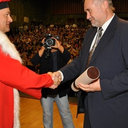Oregano demonstrates distinct tumour-suppressive effects in the breast carcinoma model.
Sleutelwoorden
Abstract
OBJECTIVE
There has been a considerable interest in the identification of natural plant foods for developing effective agents against cancer. Thus, the anti-tumour effects of oregano in the in vivo and in vitro breast cancer model were evaluated.
METHODS
Lyophilized oregano (ORE) was administered at two concentrations of 0.3 and 3 % through diet. The experiment was terminated 14 weeks after carcinogen administration. At autopsy, mammary tumours were removed and prepared for histopathological and immunohistochemical analysis. Moreover, in vitro evaluation in MCF-7 cells was carried out.
RESULTS
Low-dose ORE suppressed tumour frequency by 55.5 %, tumour incidence by 44 %, and tumour volume by 44.5 % compared to control animals. Analysis of rat tumour cells showed Ki67, VEGFR-2, CD24, and EpCAM expression decrease and caspase-3 expression increase after low-dose ORE treatment. High-dose ORE lengthened tumour latency by 12.5 days; moreover, Bcl-2, VEGFR-2, CD24, and EpCAM expression decrease and caspase-3 expression increase in carcinoma cells were observed. Histopathological analysis revealed a decrease in the ratio of high-/low-grade carcinomas in both treated groups. In vitro studies showed that ORE decreased survival and proliferation of MCF-7 cells. In ORE-treated MCF-7 cells, an increase in cells expressing sub-G 0/G 1 DNA content and an increase in the percentage of annexin V/PI positive MCF-7 cells were observed. In vitro, both caspase-dependent and possible non-caspase-dependent apoptotic pathways were found. The deactivation of anti-apoptotic activity of Bcl-2, a decrease in mitochondrial membrane potential, and the activation of mitochondrial apoptosis pathway were observed in the ORE-treated MCF-7 cells.
CONCLUSIONS
Our results demonstrate, for the first time, a distinct tumour-suppressive effect of oregano in the breast cancer model.



